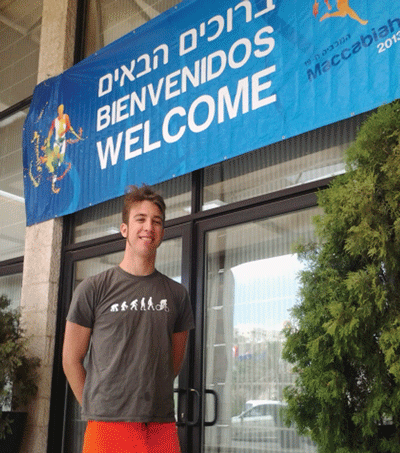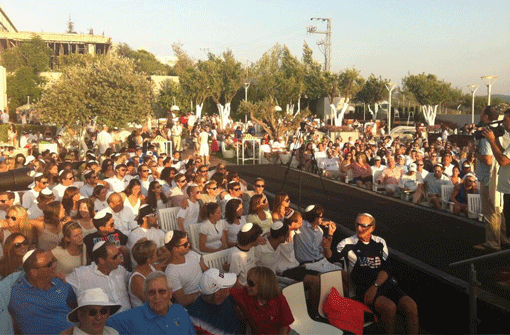One week before the competition, Israel Connect hosts a mass Bar Mitzva ceremony for participants who never had one
By HILLEL KUTTLER
NEVE ILAN, Israel (JTA) — Luke Rosener removed his orange T-shirt, changed into a white dress shirt and alighted from a chartered bus.
The garb was a far cry from the uniform Rosener will wear while playing for the U.S. volleyball team at the Maccabiah Games, the 78-nation sports competition that began this week in Israel.
The attire was more befitting a religious ceremony — in this case, his Bar Mitzva.
Rosener, 22, of Cupertino, Calif., had never had a Bar Mitzva, owing to his family’s financial situation and his early struggles with dyslexia. But as part of the 1,200-member U.S. Maccabiah delegation, Rosener encountered a ready-made opportunity to become a Bar Mitzva alongside scores of new friends also celebrating the traditional rite of passage.
That’s because Maccabi USA, the American branch of the international sports movement, brings participants to Israel a week before the competition for a mandatory program of touring and discussions rich in Jewish content. In recent years the program, known as Israel Connect, has featured a mass Bar Mitzva ceremony for participants who never had one.
“There’s so much more to [the Maccabiah] than playing sports,” said Jeffrey Bukantz, Maccabi USA’s general chairman and a former fencing Olympian. “We really do consider it the flagship of the program. It’s to the point that Israel Connect is more important than the actual sports. The kids are really impacted by the program.”

On the lush grounds of a reception center in the hills west of Jerusalem, a mile beyond the Elvis Inn pub guarded by a white statue of the King, the delegation gathered in the setting sun on July 16 for the ceremony. The entry hall’s long red carpet was lined with red, white and blue balloons and round tables in the vast garden were stacked with wrapped presents.
The ceremony coincided with Tisha B’Av, the 25-hour fast commemorating the destruction of both ancient temples — a day on which celebrations are frowned upon. But as he prepared to chant the Torah portion designated for the closing hours of many fast days, Daniel Greyber, the delegation’s official rabbi, offered a fresh perspective.
“The afternoon of Tisha B’Av is a time of rebuilding, of looking forward,” Greyber said. “The B’nai Mitzva ceremony connects us to the Jewish people — not only in this world at this time but for all of history. In that regard, it requires celebrating.”
Along with the U.S. team’s assistant rabbi, Noam Raucher, Greyber led the crowd in spirited singing. And he punctuated the Torah reading with references to group discussions he had led the previous day covering biblical events and their relevance today.
Dave Blackburn, a standout softball pitcher who has competed in six Maccabiah Games, recited the Birkat Hagomel traditionally recited by those who have escaped harm. In 2009, Blackburn was nearly killed in a car crash, an accident that claimed his right leg below the knee and broke 27 bones.
“I’ve lived to share this Maccabiah experience with you, my extended family,” Blackburn said from his wheelchair.

Greyber called the Maccabiah participants to the Torah in three groups, and as the last one ascended the podium, he called for attention.
“Everyone,” he said, “look at the miracle that is happening as the sun goes down over Jerusalem, as this group that has never been to Israel and never had a Bar or Bat Mitzva is having an aliya for the first time.”
Then Blackburn’s nephew Landon stepped forward.
“My uncle,” he began, struggling through tears to get the words out, “is keeping me alive, and that’s all that matters.”
Landon Blackburn, a wrestler, said later that his uncle’s participation in the games is his most cherished aspect of the trip. His own father would not have permitted him to participate without his uncle’s influence, he said.
A native of La Porte, Ind., Landon, 18, said he grew up celebrating Jewish holidays, but as a rebellious child opted not to have a Bar Mitzva.
“But all that did was make my life harder, that the weight of the world was on my shoulders,” he said. “I didn’t have anything to help me cope with the hardships of life.”
Having this Bar Mitzva, Landon said, makes him feel “100 percent better about my outlook on life.”
The final blessing chanted, Greyber led the singing of “Siman Tov” as candies were tossed onto the podium and participants wiped tears. Members of the two rugby teams leapt from their front-row chairs and posed near the stone wall overlooking the hills. Some did a jig in the seating area.
Greyber offered another song, and then another. Tisha B’Av was just about over, but the celebration wasn’t. Athletes jumped onto the podium to pose with their rabbi, who offered one last thought to those milling about.
“We are blessed to be here together,” Greyber said. “I have no idea what great and amazing things will come from this moment, but I am sure that within you is the infinity of God’s goodness.”
Rosener emerged fulfilled.
“I was in the moment, surrounded by other people, saying the blessing. I felt complete,” he said. “Something was added that had been missing from my life.”



















